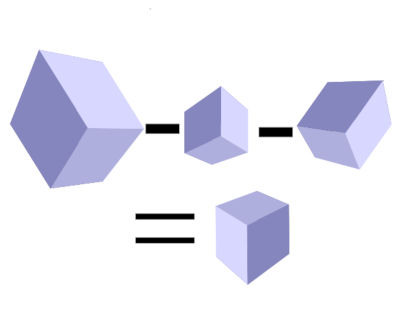| Not 42 But 33 - The Sum Of Three Cubes |
| Written by Mike James | |||
| Sunday, 31 March 2019 | |||
|
Number theory is the purest of mathematics, although often said to have no uses. Of course, if you are a computer scientist you know better. The news is that we now know that a 64-year search for three integers that cubed add up to 33 has been solved. That just leaves 42.
Fermat's equation is famous and a solved problem. We now know that an+bn=cn has no solutions for n>2 with everything a positive integer. This means that, for instance, a3+b3=c3 has no solutions, i.e. there are no pairs of cubes that add up to another cube. Physically this means that you cannot take two solid integer cubes and amalgamate them so as to produce another solid integer cube. OK. so game over for two cubes, but what about three? The sum-of-three-cubes problem has been around for a long time and is slightly less restrictive than Fermat's problem: Find three cubes, possibly negative, that sum to a given integer. That is, does: x3+y3+z3=n with x,y and z integers, possibly negative, and n, a positive integer, not necessarily a cube. Solutions for this have been the subject of computer search since 1955 and for values less than 100 the question was open for only two numbers, 33 and 42. Now Andrew Booker has settled the n=33 case: (8,866,128,975,287,528)³ + (–8,778,405,442,862,239)³ + Now perhaps you can see the difficulty in settling the matter! The simple-minded approach to the problem is to start three nested loops on large negative and positive integer ranges and compute the sum of the cubes and see if the result is 33. This is not practical as it tests far too many values. You can use math to narrow down the search. For example, an equation remains true if you take it modulo m. So: x3+y3+z3=n implies (x3+y3+z3) mod 9 =n mod 9 and as the only values mod 9 are 0 to 8 we can work out the possible mod 9 cubes - 0,1 or 8. You can't use these values to make 4 or 5 in the equation. So n mod 9 cannot be 4 or 5 and this rules out a lot of values of n. In 2016 all of the numbers less than 100 that were not 4 or 5 mod 9 had solutions, apart from 33 and 42. It had been conjectured, in 1992, that every n that was not equal to 4 or 5 mod 9 had infinitely many solutions but this is still an open question. We know that it is true for 1 and 2 but that is all. Clearly finding a solution for 33 and 42 is necessary if the conjecture is true, but having found one is no proof and finding none at all is only evidence that we might need to try harder. The research was inspired by a Numberphile video and here is an interview with Andrew Booker on Numberphile: The new algorithm reduced the search space, but it still took approximately 23 core-years over one month of real time. So 42 is the next target and it took 7.5 million years for Deep Thought to discover the significance of 42 in HHGTTG. Let us hope the new algorithm can find three cubes that sum to 42 in a little less time.
More InformationRelated ArticlesGoogle Smashes Pi Record For Pi Day A New Mersenne Prime Discovery Abel Prize For Proving Fermat's Last Theorem Finding Solutions To Diophantine Equations By Smell Search For Twin Prime Proof Slows To be informed about new articles on I Programmer, sign up for our weekly newsletter, subscribe to the RSS feed and follow us on Facebook or Linkedin.
Comments
or email your comment to: comments@i-programmer.info |
|||
| Last Updated ( Sunday, 31 March 2019 ) |


